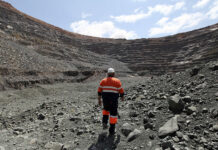
[miningmx.com] — THE proposed deal between diamond miners Trans Hex and De Beers on the takeover of Namaqualand Mines was far from complete and subject to some conditions which might prove difficult to meet.
The two companies announced on Friday that Trans Hex’s 50% held associate company, Emerald Panther Investments (EPI), would buy Namaqualand from De Beers for R225m cash. This followed De Beers’ earlier decision to restructure its South African operations in a process which also saw it selling Finsch to Aim-listed Petra Diamonds.
Namaqualand Mines is located close to Trans Hex’s Baken Mine on the West Coast. It has not been in operation since the second quarter of 2010, with De Beers only continuing with a rehabilitation programme.
“EPI will acquire a diamond prospecting right, mining rights, mining and processing equipment, certain immovable properties and infrastructure relating to Namaqualand Mines,’ said Trans Hex. “EPI will (also) assume the liabilities relating to Namaqualand Mines and take on the environmental rehabilitation programme that is currently underway.’
The transaction followed the collapse of previous talks over Namaqualand which was terminated in March 2009 due to the fallout from the financial crisis.
“We’re not in a recession anymore,’ said Trans Hex CEO Llewllyn Delport when asked why the parties managed to agree on a deal this time around. “We ended (the previous discussions) on a friendly note when they (De Beers) decided not (to) proceed given the economic circumstances.’
However, Delport was also quick to point out that this was “the beginning of a process in which a lot still needs to happen’.
As part of the deal, Trans Hex would have to assume all liabilities related to Namaqualand’s environmental rehabilitation liability and continue to support some sustainability initiatives started by De Beers. These included the lease of lands to South African National Parks, as well as abalone, oyster and wind farms.
Delport remained coy on the extent of the liabilities and costs that would be incurred. “This forms part of details that still needs to be sorted out before we communicate with shareholders,’ he said.
Still, Trans Hex has already agreed to contribute R10m more to the sale price towards ongoing rehabilitation costs until the transaction became effective. Trans Hex would also have to convince the DMR it was able to assume the rehabilitation liability.
Another potential obstacle was whether Trans Hex and the department of mineral resources could agree on the DMR’s 20% interest in Namaqualand. The DMR acquired the stake in February 2007 when the West Coast operations of state-owned Alexkor and Namaqualand were amalgamated.
Also, the exact shareholding format of EPI has not yet been finalised. Besides Trans Hex’s 50% stake, investment firm RE:CM and Calibre Limited own 34% with a Trans Hex management team structure named Dinoka Investments holding another 11%. The remaining 5% shareholding would be allocated to broad-based empowerment groups.
“Certain aspects relating to the shareholding of EPI have not yet been finalised and is therefore subject to change,’ warned Trans Hex.
The parties anticipate that the transaction would be concluded or waived within six to twelve months.











